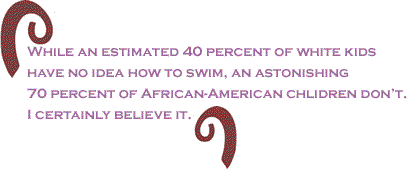This
morning, as I got ready for work and had the local news
humming in the background as I usually do, I heard a report
about drowning deaths in our city, with a national spin
attached.
According
to the representative speaking on behalf of a local YMCA
location, most parents whose children drown had no idea
that their kids didn’t know how to swim. How can this be?

The
U.S. Consumer Product Safety Commission says that about
260 children under the age of five drown each year in residential
swimming pools and hot tubs. An additional 3,000 children
under the age of five are taken to emergency rooms for submersion-related
accidents. Moreover, drowning represents the fourth-leading
cause of death to children up to age five.
Those
numbers are nothing to scoff at. As temperatures reach sweltering
levels and the mercury runs so high that parents aren’t
even taking their children to the park, families find themselves
finding sanctuary in pools – be it their own, one of a family
member or friend, public facilities or those associated
with a membership to a recreational facility.
This
topic is also especially relevant for a reason other than
the season, and that is because of a notion that seems rooted
in stereotype, but in my mind just may ring quite true:
Most black people don’t know how to swim. Now, I know some
people may not like me giving credence to what for ages
has sounded like a myth or fiction, but apparently it really
is true.
After
all, even ABC News recently reported that the drowning rate
for black kids is three times as high as that for whites.
While an estimated 40 percent of white kids have no idea
how to swim, an astonishing 70 percent of African-American
chlidren don’t. I certainly believe it. In seeing how few
black kids attend swimming lessons at the place my children
frequent and in having met many black adults over the years
who didn’t know how to handle themselves in water, this
must be recognized.
It’s
bigger than black women’s irrational fears of getting their
straightened hair wet, too. It is, I perceive, also encoded
with issues of access, opportunity and cost. Many free public
pools no longer exist. Ostensibly, like most Americans,
many black people don’t have their own pools at home. And
swimming lessons, of course, are far from free. (Little
Lady #1 has been taking classes since she was three, and
I shudder to think about how much we’ve already spent on
those lessons.)

I
was fortunate enough to grow up with a pool at home. I was
in the water before I could intelligibly talk. And I certainly
knew how to swim decently before I was in Kindergarten.
Water safety and knowing how to handle myself in it perhaps
would not have been as much of a necessity or priority if
my parents’ house didn’t come with a pool.
As
much as we are inclined to talk about the many things our
children are “at risk” for, in the summer time, swimming
pools should certainly get top billing as well. The Consumer
Product Safety Commission also offers some no-nonsense tips
to keep our children safe.
•
Never leave a child unsupervised near a pool.
•
Instruct babysitters about potential hazards to young children
in and around swimming pools and the need for constant supervision.
•
Completely fence the pool. Install self-closing and self-latching
gates. Position latches out of reach of young children.
Keep all doors and windows leading to the pool area secure
to prevent small children from getting to the pool. Effective
barriers and locks are necessary preventive measures, but
there is no substitute for supervision.
•
Do not use flotation devices as a substitute for supervision.

•
Never use a pool with its pool cover partially in place,
since children may become entrapped under it. Remove the
cover completely.
•
Place tables and chairs well away from the pool fence to
prevent children from climbing into the pool area.
•
Keep toys away from the pool area because a young child
playing with the toys could accidentally fall in the water.
•
Remove steps to above ground pools when not in use.
•
Have a telephone at poolside to avoid having to leave children
unattended in or near the pool to answer a telephone elsewhere.
Keep emergency numbers at the poolside telephone.
•
Learn CPR.
•
Keep rescue equipment by the pool.

BlackCommentator.com Columnist K. Danielle Edwards - a Black full-time working mother and wife, with a
penchant for prose, a heart for poetry, a love of books
and culture, a liking of fashion and style, a knack for
news and an obsession with facts - beating the odds, defying
the statistics. Sister Edwards is a Nashville-based writer, poet and communications
professional, seeking to make the world a better place,
one decision and one action at a time. To her, parenting
is a protest against the odds, and marriage is a living
mantra for forward movement. Her work has appeared in BLACK MARRIED MOMMA,
ParentingExpress, Magazine, The Black
World Today, Africana.com, The Tennessean and other publications. She is the author of Stacey Jones: Memoirs of Girl & Woman, Body & Spirit,
Life & Death (2005)
and is the founder and creative director of The Pen: An Exercise in the Cathartic Potential of the Creative
Act, a nonprofit creative writing project designed for
incarcerated and disadvantaged populations. Click
here to contact Ms. Edwards |

